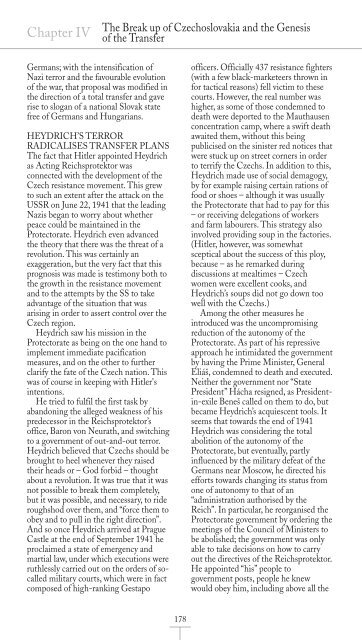the nationality of all inhabitants of the czech provinces and ...
the nationality of all inhabitants of the czech provinces and ...
the nationality of all inhabitants of the czech provinces and ...
Create successful ePaper yourself
Turn your PDF publications into a flip-book with our unique Google optimized e-Paper software.
Chapter IV<br />
Germans; with <strong>the</strong> intensification <strong>of</strong><br />
Nazi terror <strong>and</strong> <strong>the</strong> favourable evolution<br />
<strong>of</strong> <strong>the</strong> war, that proposal was modified in<br />
<strong>the</strong> direction <strong>of</strong> a total transfer <strong>and</strong> gave<br />
rise to slogan <strong>of</strong> a national Slovak state<br />
free <strong>of</strong> Germans <strong>and</strong> Hungarians.<br />
HEYDRICH’S TERROR<br />
RADICALISES TRANSFER PLANS<br />
The fact that Hitler appointed Heydrich<br />
as Acting Reichsprotektor was<br />
connected with <strong>the</strong> development <strong>of</strong> <strong>the</strong><br />
Czech resistance movement. This grew<br />
to such an extent after <strong>the</strong> attack on <strong>the</strong><br />
USSR on June 22, 1941 that <strong>the</strong> leading<br />
Nazis began to worry about whe<strong>the</strong>r<br />
peace could be maintained in <strong>the</strong><br />
Protectorate. Heydrich even advanced<br />
<strong>the</strong> <strong>the</strong>ory that <strong>the</strong>re was <strong>the</strong> threat <strong>of</strong> a<br />
revolution. This was certainly an<br />
exaggeration, but <strong>the</strong> very fact that this<br />
prognosis was made is testimony both to<br />
<strong>the</strong> growth in <strong>the</strong> resistance movement<br />
<strong>and</strong> to <strong>the</strong> attempts by <strong>the</strong> SS to take<br />
advantage <strong>of</strong> <strong>the</strong> situation that was<br />
arising in order to assert control over <strong>the</strong><br />
Czech region.<br />
Heydrich saw his mission in <strong>the</strong><br />
Protectorate as being on <strong>the</strong> one h<strong>and</strong> to<br />
implement immediate pacification<br />
measures, <strong>and</strong> on <strong>the</strong> o<strong>the</strong>r to fur<strong>the</strong>r<br />
clarify <strong>the</strong> fate <strong>of</strong> <strong>the</strong> Czech nation. This<br />
was <strong>of</strong> course in keeping with Hitler's<br />
intentions.<br />
He tried to fulfil <strong>the</strong> first task by<br />
ab<strong>and</strong>oning <strong>the</strong> <strong>all</strong>eged weakness <strong>of</strong> his<br />
predecessor in <strong>the</strong> Reichsprotektor’s<br />
<strong>of</strong>fice, Baron von Neurath, <strong>and</strong> switching<br />
to a government <strong>of</strong> out-<strong>and</strong>-out terror.<br />
Heydrich believed that Czechs should be<br />
brought to heel whenever <strong>the</strong>y raised<br />
<strong>the</strong>ir heads or – God forbid – thought<br />
about a revolution. It was true that it was<br />
not possible to break <strong>the</strong>m completely,<br />
but it was possible, <strong>and</strong> necessary, to ride<br />
roughshod over <strong>the</strong>m, <strong>and</strong> “force <strong>the</strong>m to<br />
obey <strong>and</strong> to pull in <strong>the</strong> right direction”.<br />
And so once Heydrich arrived at Prague<br />
Castle at <strong>the</strong> end <strong>of</strong> September 1941 he<br />
proclaimed a state <strong>of</strong> emergency <strong>and</strong><br />
martial law, under which executions were<br />
ruthlessly carried out on <strong>the</strong> orders <strong>of</strong> soc<strong>all</strong>ed<br />
military courts, which were in fact<br />
composed <strong>of</strong> high-ranking Gestapo<br />
The Break up <strong>of</strong> Czechoslovakia <strong>and</strong> <strong>the</strong> Genesis<br />
<strong>of</strong> <strong>the</strong> Transfer<br />
178<br />
<strong>of</strong>ficers. Offici<strong>all</strong>y 437 resistance fighters<br />
(with a few black-marketeers thrown in<br />
for tactical reasons) fell victim to <strong>the</strong>se<br />
courts. However, <strong>the</strong> real number was<br />
higher, as some <strong>of</strong> those condemned to<br />
death were deported to <strong>the</strong> Mauthausen<br />
concentration camp, where a swift death<br />
awaited <strong>the</strong>m, without this being<br />
publicised on <strong>the</strong> sinister red notices that<br />
were stuck up on street corners in order<br />
to terrify <strong>the</strong> Czechs. In addition to this,<br />
Heydrich made use <strong>of</strong> social demagogy,<br />
by for example raising certain rations <strong>of</strong><br />
food or shoes – although it was usu<strong>all</strong>y<br />
<strong>the</strong> Protectorate that had to pay for this<br />
– or receiving delegations <strong>of</strong> workers<br />
<strong>and</strong> farm labourers. This strategy also<br />
involved providing soup in <strong>the</strong> factories.<br />
(Hitler, however, was somewhat<br />
sceptical about <strong>the</strong> success <strong>of</strong> this ploy,<br />
because – as he remarked during<br />
discussions at mealtimes – Czech<br />
women were excellent cooks, <strong>and</strong><br />
Heydrich’s soups did not go down too<br />
well with <strong>the</strong> Czechs.)<br />
Among <strong>the</strong> o<strong>the</strong>r measures he<br />
introduced was <strong>the</strong> uncompromising<br />
reduction <strong>of</strong> <strong>the</strong> autonomy <strong>of</strong> <strong>the</strong><br />
Protectorate. As part <strong>of</strong> his repressive<br />
approach he intimidated <strong>the</strong> government<br />
by having <strong>the</strong> Prime Minister, General<br />
Eliáš, condemned to death <strong>and</strong> executed.<br />
Nei<strong>the</strong>r <strong>the</strong> government nor “State<br />
President” Hácha resigned, as Presidentin-exile<br />
Beneš c<strong>all</strong>ed on <strong>the</strong>m to do, but<br />
became Heydrich’s acquiescent tools. It<br />
seems that towards <strong>the</strong> end <strong>of</strong> 1941<br />
Heydrich was considering <strong>the</strong> total<br />
abolition <strong>of</strong> <strong>the</strong> autonomy <strong>of</strong> <strong>the</strong><br />
Protectorate, but eventu<strong>all</strong>y, partly<br />
influenced by <strong>the</strong> military defeat <strong>of</strong> <strong>the</strong><br />
Germans near Moscow, he directed his<br />
efforts towards changing its status from<br />
one <strong>of</strong> autonomy to that <strong>of</strong> an<br />
“administration authorised by <strong>the</strong><br />
Reich”. In particular, he reorganised <strong>the</strong><br />
Protectorate government by ordering <strong>the</strong><br />
meetings <strong>of</strong> <strong>the</strong> Council <strong>of</strong> Ministers to<br />
be abolished; <strong>the</strong> government was only<br />
able to take decisions on how to carry<br />
out <strong>the</strong> directives <strong>of</strong> <strong>the</strong> Reichsprotektor.<br />
He appointed “his” people to<br />
government posts, people he knew<br />
would obey him, including above <strong>all</strong> <strong>the</strong>


